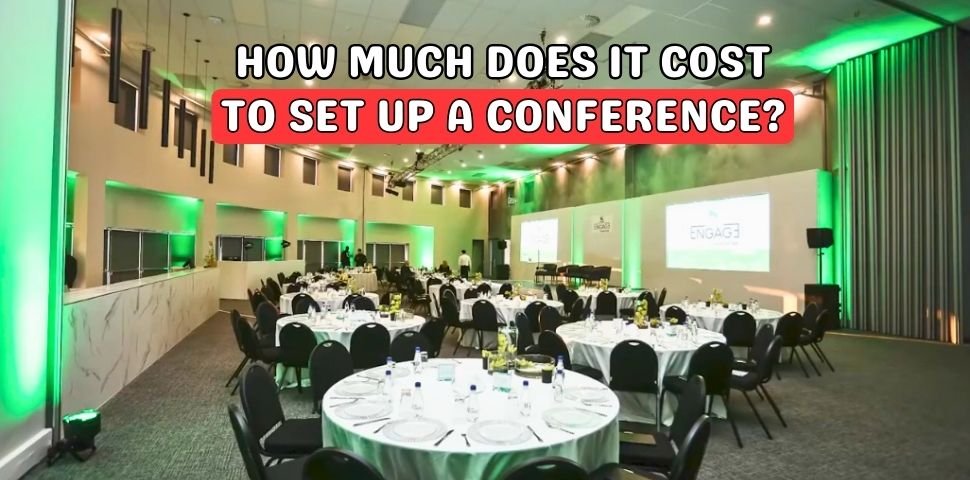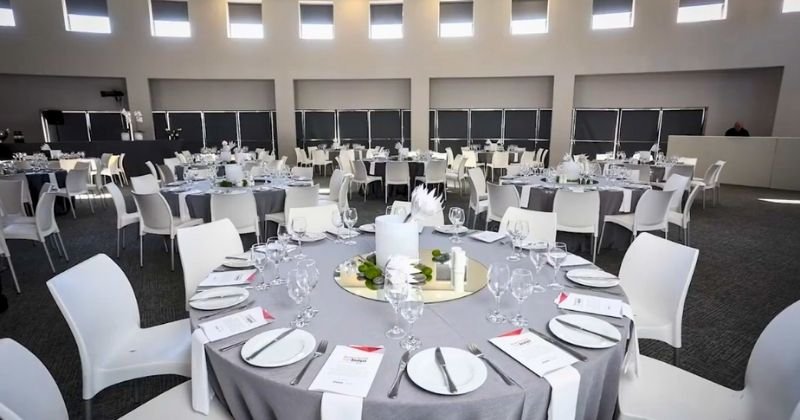The process of organizing a conference is a great opportunity to bring people together to share their ideas and knowledge. Setting up a successful conference requires careful planning, from choosing the right venue to lining up engaging speakers.
Every decision you make can significantly impact the overall experience for your attendees. Many often wonder how much does it cost to set up a conference.
The expenses can range dramatically from $150,000 to over $3,000,000 depending on various factors like venue, catering, speakers, and technology. Major costs include renting the venue, providing food and beverages, utilizing event apps, marketing, and arranging AV equipment.
Understanding these costs is crucial for effective planning. In this article, we’ll explore each of these factors in detail to help you budget for your next successful event.
Key Elements of a Good Conference
Conference planning can seem daunting at first, but focusing on the essentials makes it easier. By honing in on what truly matters, you create an event that attendees will love. Let’s explore the key elements that contribute to a successful conference:
- Clear Objectives: Defining a clear purpose sets the tone for your event. This ensures all decisions align with your goals.
- Engaging Speakers: Dynamic speakers captivate and inspire the audience. They bring energy and keep everyone interested throughout.
- Relevant Content: Offering content that matters to your attendees adds value. It should address their needs and spark interest.
- Interactive Sessions: Interactive elements make the event lively. Activities like workshops encourage participation and engagement.
- Ideal Venue: Selecting the right venue enhances the experience. It should match the event’s size and atmosphere.
- Effective Marketing: Promoting the event attracts the right crowd. Utilize various channels to spread the word effectively.
- Networking Opportunities: Providing chances to connect adds significant value. Attendees can build relationships and share ideas.
- Smooth Logistics: Efficient organization keeps everything on track. Attention to scheduling and details is crucial.
- Technology Integration: Leveraging technology enhances engagement. Tools like apps and live polls involve participants actively.
- Post-Event Follow-Up: Following up maintains the event’s momentum. Sharing materials and feedback solidifies its impact.
Which Factors to Keep in Mind While Setting Up a Conference?
Organizing a conference involves various critical factors that determine the success of the event. Each step plays a key role in creating a valuable experience for attendees. From defining your objectives to ensuring smooth coordination, focusing on details ensures everything runs efficiently. Let’s explore the essential factors to keep in mind when setting up an HR conference as an example:

Defining Clear Objectives
Your conference’s purpose and goals should guide all your planning efforts. Understanding what you want to achieve helps with decision-making. This clarity will keep the content, structure, and flow on track. Without specific objectives, your conference can lose focus.
Setting a Realistic Budget
Establishing a well-rounded budget is crucial for managing expenses. Include venue, catering, marketing, and contingency funds for unexpected costs. Having a financial plan ensures everything fits within your resources. Avoid cutting corners that can impact the overall quality of the event.
Identifying Your Target Audience
Knowing who will attend shapes the event content and experience. Attendee preferences must inform your topics and session formats. Understanding their needs will enhance engagement and satisfaction. Consider factors like career level and interests when planning.
Choosing the Right Venue
Select a location that is accessible and equipped for your needs. Ensure the venue can accommodate the number of participants. A convenient location will encourage better participation.
Scheduling the Event Carefully
Pick a date that works best for your attendees without competing with other events. Timing can influence attendance and satisfaction. Consider seasonal factors when choosing the time of year. Make sure your selected date fits well within your planning timeline.
Planning Engaging Content
Offer sessions that add real value to your attendees’ experience. Use industry experts to bring fresh perspectives and expertise. Including interactive workshops or panels keeps things lively. Make sure the content remains relevant to the audience’s career interests.
Find Good Keynote Speaker
Securing a good keynote speaker can elevate any event, bringing insights and energy that resonate with the audience. If you are looking for keynote speaker like for an HRM conference you must keep in mind to prioritize those with expertise in human resource trends, engagement, and organizational development to make a lasting impact while finding keynote speakers for HRM conferences.
Ensuring Reliable Technology and Equipment
Make sure the conference has the technical setup it needs to succeed. AV equipment, such as microphones and projectors, should work smoothly. Reliable internet access is a must for seamless sessions. Technical support should be on standby to address any issues.
Creating an Effective Marketing Strategy
Promote the event using various platforms to attract your desired audience. Use social media, email marketing, and partnerships to boost visibility. Start marketing efforts early to generate interest. Tailor your message to align with the conference’s objectives.
Streamlining the Registration Process
Offer a smooth and simple registration process to encourage attendance. Consider using online registration tools to streamline the experience. Ease of registration can impact how attendees perceive the event. Clear instructions and accessible platforms are essential.
Coordinating Logistics Efficiently
Effective coordination ensures everything runs without hiccups on the day. Organize transportation and accommodation options for out-of-town participants. On-site management must handle everything from setup to guest services. Well-thought-out logistics are key to a flawless event.
Providing Networking Opportunities
Create ample space for participants to connect and network. Set up informal social events or dedicated networking sessions. These moments help build relationships and professional connections. Attendees value the chance to interact with peers and experts alike.
Gathering Feedback for Improvement
Post-event feedback helps identify areas that worked well and those needing improvement. Use this input to make future conferences better. Create easy ways for attendees to share their thoughts. Evaluating feedback ensures ongoing enhancement of the conference experience.
How Much Does it Cost to Set up a Conference?
Organizing a conference comes with a wide range of costs, depending on various factors such as the event’s size and location. Prices can start around $150,000 and can go as high as $3,000,000 for larger events. Several key components contribute to these expenses, each playing a crucial role in determining the overall budget.

Venue Costs
The venue is typically the most expensive aspect of hosting a conference. Prices range from $950 to $1,250 per hour, depending on the location. Choosing a venue that meets the event’s needs is vital to ensure comfort and accessibility for attendees.
Location is a significant factor in venue pricing, with city centers and premium facilities costing more. Event organizers must also consider extra charges for facilities like catering areas or additional breakout rooms. Selecting the right venue will depend on the event’s scale and participant expectations.
Food and Beverage
Catering for a conference is a major cost, ranging from $125 to $200 per person daily. This covers meals and snacks for attendees throughout the day. Well-planned catering enhances the conference experience and keeps participants satisfied.
The number of attendees significantly affects the overall catering budget. Large conferences will require substantial food and beverage arrangements, contributing to increased costs. High-quality food options are also important for creating a positive impression.
Event App
A custom event app typically costs around $1,500, but it adds great value to the attendee experience. These apps help streamline communication, schedule management, and interaction during the event. Investing in technology can elevate the overall experience for participants.
Developing an app ensures seamless coordination and easy access to important information. Event organizers benefit from real-time updates, keeping everything on track. For larger events, having an app becomes even more crucial to manage the complexity of the conference.
Speaker Fees
Securing keynote speakers is a major expense that varies based on their expertise and popularity. Fees can range significantly, making it essential to allocate enough budget for high-quality speakers. Well-known speakers can attract more attendees, adding value to the event.
Popular or industry-renowned speakers usually demand higher fees. However, their contribution can increase attendee engagement and elevate the event’s credibility. Balancing the speaker’s reputation with your budget is key to delivering an impactful conference.
Marketing and Promotion
Promoting a conference requires a dedicated budget for advertising and social media campaigns. These efforts help attract the right audience and create excitement around the event. Effective promotion is crucial to maximizing attendance and event visibility.
Social media marketing, email campaigns, and partnerships play a significant role in the promotional strategy. Allocating funds to digital and traditional marketing channels ensures broader outreach. Promotional materials like banners and flyers add to the overall marketing costs.
Audio-Visual Equipment
AV equipment is essential for presentations, workshops, and keynote speeches, often adding substantial costs. If not included in the venue fee, renting microphones, projectors, and screens becomes an additional expense. High-quality AV setups contribute to a professional conference atmosphere.
Technical issues can negatively affect the event, making reliable AV equipment a necessity. Hiring experienced AV support ensures that the event runs smoothly without disruptions. It’s important to check whether the venue offers in-house AV services or if external vendors are needed.
Miscellaneous Expenses
Miscellaneous costs cover items like registration systems, badges, signage, and other event materials. Although these may seem minor, they add up, contributing to the overall budget. Proper organization ensures these elements support a seamless attendee experience.
Materials like branded merchandise, signage, and participant handouts are small but impactful elements. These miscellaneous costs enhance attendee engagement and contribute to a polished event. Including these details in the budget will ensure no last-minute surprises.
The cost of setting up a conference depends on multiple factors, each contributing to the event’s success. Understanding and planning for these expenses will ensure you deliver an exceptional experience. Keep these cost components in mind for effective budgeting and a well-organized conference.
Can Anyone Set up a Conference?
Yes, anyone can set up a conference, but it requires careful planning and dedication. Organizing an event involves managing many details, such as securing a venue and attracting the right audience. Whether it’s a small gathering or a large-scale event, thorough preparation is vital. For example, if you are setting up a conference on HR, understanding the key purpose of HR conferences will help tailor the event to meet the specific needs of attendees.

While anyone can do it, successful conferences require thoughtful coordination and strategic decisions. Identifying the event’s goals and objectives is crucial for guiding every planning step. Budgeting for various aspects, including speakers and logistics, is another important part of the process. With the right resources, even first-time organizers can pull off a smooth and engaging conference.
Tips to Help You Set up a Conference Within Your Budget
Setting up a conference within your budget can feel overwhelming, but with the right strategies, it’s manageable. By making smart choices and focusing on key areas, you can plan a successful event. Here are some useful tips to help you stay within budget:
- Prioritize Your Expenses: Focus on the most essential aspects like venue, speakers, and technology. This will help keep non-essential costs under control.
- Negotiate with Vendors: Always negotiate with vendors for better deals on venues and services. Many providers offer discounts if asked directly.
- Use Technology Efficiently: Opt. for affordable event apps or digital tools that streamline planning. These can reduce the need for costly printed materials.
- Choose an Off-Peak Date: Booking a venue during off-peak times can significantly lower rental costs. Avoiding high-demand seasons saves money.
- Limit Catering Options: Offering fewer meal choices can cut down catering costs without sacrificing quality. Attendees appreciate quality over variety.
- Opt. for Local Speakers: Hiring local speakers helps reduce travel and accommodation costs. This ensures budget savings without compromising expertise.
- Leverage Social Media for Marketing: Use free or low-cost social media platforms to promote the event. This reduces expensive advertising fees and increases reach.
Frequently Asked Questions about How Much Does it Cost to Set up a Conference?
The cost of setting up a conference depends on a number of factors, such as its size, location, and specific requirements. Understanding the key elements affecting the budget can help you plan effectively. Here are six frequently asked questions about conference costs.
What is the Average Cost of Setting up a Conference?
The average cost of organizing a conference can range from $150,000 to over $3,000,000. This depends on factors such as venue rental, catering, speakers, and technology. Smaller events tend to be more budget-friendly than larger ones.
What is the Biggest Expense when Setting up a Conference?
The venue is often the largest expense, with costs ranging from $950 to $1,250 per hour. High-end venues or city-center locations tend to charge more. Additional facilities and services can also increase the overall price.
How Can I Reduce Costs when Planning a Conference?
To cut costs, consider booking during off-peak seasons and negotiating with vendors for better deals. Limiting catering options and using affordable event technology also helps. Effective budgeting can significantly reduce unnecessary expenses without sacrificing quality.
How Much Should I Budget for Catering at a Conference?
Expect to spend between $125 to $200 per person per day for meals and snacks. This covers three meals and two snacks. High-quality catering may cost more but enhances the overall experience for your attendees.
Are Speaker Fees a Significant Part of the Conference Budget?
Yes, keynote speaker fees can vary widely based on their popularity and expertise. High-profile speakers can significantly increase costs, while local or less-known speakers may offer a more budget-friendly option without sacrificing content quality.
Does the Size of the Conference Impact the Overall Cost?
Larger conferences typically cost more due to increased venue, catering, and logistical requirements. Smaller events can be more manageable, allowing for more flexible budgets. The scale of your event directly impacts the overall planning and associated costs.
Last Words
Organizing a conference is a rewarding endeavor that brings people together for knowledge sharing and networking. By focusing on clear objectives, engaging content, and efficient planning, you can create an event that resonates with attendees.
A key consideration is understanding how much does it cost to set up a conference, as expenses can vary widely based on venue, catering, speakers, and technology.
Staying mindful of your budget while making strategic choices allows you to deliver a memorable experience without overspending. With careful preparation and attention to detail, anyone can successfully host a conference that meets their goals and delights participants.
